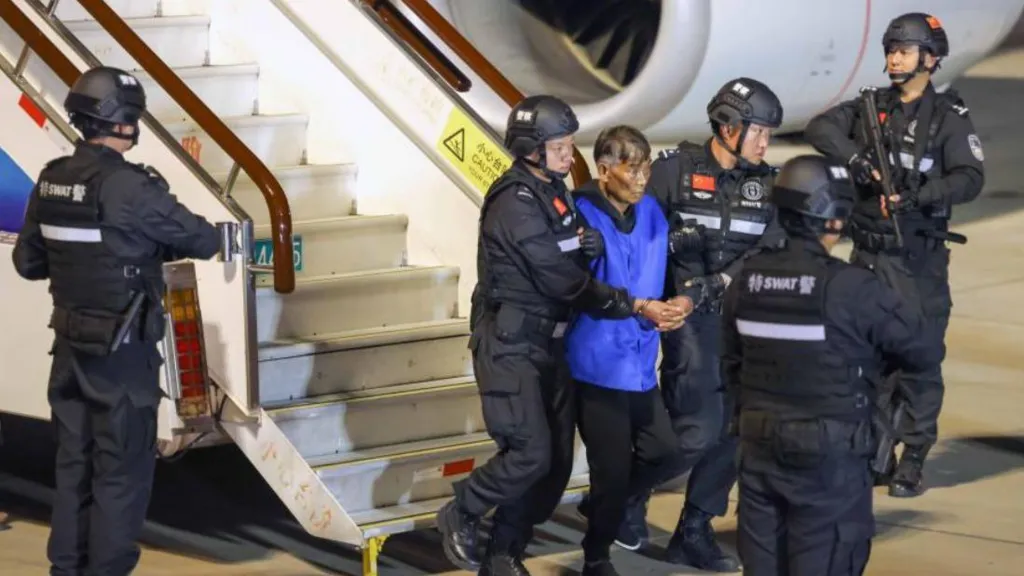
China Executes Five Members of Myanmar-Based Scam Syndicate as Beijing Intensifies Crackdown on Cross-Border Fraud
In a landmark judgment underscoring Beijing’s growing determination to eliminate cross-border crime, a Chinese court has sentenced five key members of a Myanmar-based criminal syndicate to death. The convicted individuals belonged to the notorious Bai family gang, which operated from Myanmar’s Kokang region—an area long infamous for its lawlessness, gambling dens, and online scam networks that target victims across Asia.
The Verdict: Death Sentences for Five, Life Terms for Others
On Tuesday, Nov. 4, a court in Shenzhen announced that five core members of the Bai crime family had been sentenced to death for their involvement in murder, fraud, and human trafficking. Two others received suspended death sentences—typically commuted to life imprisonment after two years of good behavior—while five were sentenced to life imprisonment. Nine additional associates received prison terms ranging from three to twenty years.
The Shenzhen Intermediate People’s Court found that the gang’s criminal activities had directly led to the deaths of six Chinese nationals, one suicide, and numerous injuries. According to state-run Xinhua News Agency, the defendants built and operated 41 compounds in Myanmar’s Kokang region, which were used for a range of crimes including telecom fraud, gambling, prostitution, and human trafficking.
The Bai Family Empire in Kokang
The Bai family’s rise began in the early 2000s, when they leveraged Kokang’s weak governance and proximity to China’s Yunnan province to build an empire of casinos, nightclubs, and illicit businesses. Kokang, officially part of Myanmar’s Shan State, became a haven for organized crime groups that thrived under the cover of local militias and political instability.
As Chinese authorities began to crack down on illegal gambling and cross-border criminal activity in the late 2010s, the Bai syndicate pivoted from casinos to large-scale online scam operations. Thousands of people—many lured by false promises of high-paying jobs—were trafficked into the Bai-controlled compounds, where they were coerced into conducting online fraud against victims in China and other parts of Asia.
A Network of Exploitation and Violence
The court report detailed that the Bai family gang maintained a reign of terror inside their compounds. Trafficked workers who failed to meet targets were beaten, starved, or even killed. Others were forced into sex work or smuggling activities. Chinese authorities estimate that the group’s scams defrauded victims of billions of yuan annually, feeding an underground economy that spanned multiple Southeast Asian countries.
The violence reached such levels that in 2023, Chinese authorities began mounting joint law enforcement operations with Myanmar and other neighboring states to dismantle the fraud hubs. Thousands of Chinese nationals were repatriated, and hundreds of suspected gang members were extradited to face justice in China.
China’s Expanding Anti-Fraud Campaign
The death sentences mark the latest phase of Beijing’s regional campaign against cybercrime syndicates operating beyond its borders. Over the past two years, Chinese police have worked with authorities in Thailand, Laos, and Myanmar to close down scam compounds. These efforts have intensified after reports revealed that many victims of trafficking were Chinese citizens, often lured through social media job postings before being trapped in violent conditions.
In April 2024, the United Nations Office on Drugs and Crime (UNODC) warned that cyber scam networks, particularly those operating from Southeast Asia, had become a multibillion-dollar industry. The UN estimated that hundreds of thousands of individuals are currently enslaved in scam compounds worldwide, with operations spreading to regions such as Africa, the Middle East, and South America.
The Kokang Connection: A Cross-Border Challenge
Kokang’s strategic location along the Myanmar-China border has long complicated law enforcement efforts. The region is controlled by the Myanmar National Democratic Alliance Army (MNDAA), a powerful ethnic militia that has alternately cooperated and clashed with Myanmar’s central government. Within this quasi-autonomous area, criminal syndicates have flourished with minimal oversight.
China’s crackdown in Kokang is part of a broader regional effort to dismantle these networks, which thrive in territories where weak governance, corruption, and conflict intersect. In September 2024, another Chinese court sentenced sixteen members of a related Kokang-based gang—also linked to telecom scams and human trafficking—to death, five of whom received two-year reprieves.
International Repercussions
The latest verdict has sent shockwaves through the region’s underworld and serves as a stark warning to cross-border criminal organizations. Analysts note that Beijing’s approach combines legal severity with diplomatic pressure, urging neighboring governments to extradite Chinese citizens involved in fraud and to dismantle the syndicates that shelter them.
Human rights groups, while welcoming efforts to combat trafficking, have raised concerns about due process and transparency in China’s legal system. However, Chinese authorities insist that the death sentences were the result of meticulous investigations into crimes that caused extreme human suffering.
A Message from Beijing
State media framed the verdict as a moral and political message: that China will not tolerate the exploitation of its citizens abroad. “The law will pursue criminals wherever they hide,” declared a statement from the Shenzhen court. The report emphasized that the Bai syndicate’s crimes were not merely financial but involved murder, kidnapping, and organized abuse.
Beijing’s intensified pursuit of justice in cross-border fraud cases reflects both domestic outrage and a desire to maintain stability in China’s border regions. By executing high-profile crime bosses, authorities aim to deter other groups from using neighboring countries as safe havens for illicit operations.
Conclusion
The execution sentences handed down in Shenzhen mark one of the harshest punishments ever delivered against a foreign-based Chinese crime syndicate. The downfall of the Bai family—a group that once ruled Kokang’s criminal underworld—symbolizes a turning point in China’s battle against cyber scams, trafficking, and transnational crime.
As international attention grows on the plight of those trapped in scam compounds, Beijing’s actions highlight both the gravity of the crisis and the complexities of enforcing justice across porous borders. Whether this crackdown will permanently dismantle the criminal networks remains uncertain—but the message from China’s courts is unmistakably clear: the era of impunity for cross-border scam lords is coming to an end.
Frequently Asked Questions (FAQ)
1. Who were the people executed by China?
The five individuals were senior members of the Bai family gang, a notorious criminal syndicate operating in Myanmar’s Kokang region. They were convicted of multiple crimes including murder, human trafficking, and large-scale telecom fraud.
2. What is the Kokang region, and why is it significant?
Kokang is an autonomous region in Myanmar’s Shan State, located along the Chinese border. It has long been known as a hub for casinos, illegal gambling, and cyber scam operations that target victims across Asia.
3. Why did China intervene in crimes committed in Myanmar?
Many victims of the scams were Chinese citizens. Because of the cross-border nature of the crimes and the involvement of Chinese nationals, Beijing cooperated with Myanmar authorities to extradite and prosecute the gang leaders in China.
4. How many people were affected by the Bai gang’s operations?
Authorities believe the syndicate’s operations defrauded thousands of victims, with total losses amounting to billions of yuan. The gang also trafficked and enslaved workers who were forced to participate in scams under brutal conditions.
5. What were the other sentences given in the case?
Apart from the five death sentences, two defendants received death sentences with two-year reprieves, five were sentenced to life imprisonment, and nine others received sentences ranging from three to twenty years.
6. How is China addressing cyber fraud and scam compounds?
China has launched a major regional crackdown in cooperation with Myanmar, Laos, and Thailand. Thousands of trafficked workers have been rescued and repatriated, while many ringleaders have been arrested or extradited.
7. What role did the United Nations play in exposing these scams?
The UN Office on Drugs and Crime (UNODC) reported in 2024 that cyber scam networks in Southeast Asia generate tens of billions of dollars annually, with hundreds of thousands of people trapped in forced labor conditions.
8. Does this case mark the end of scam operations in Kokang?
While the sentencing is a major milestone, experts warn that similar scam centers continue to operate under different names. Sustained international cooperation will be required to dismantle these criminal networks completely.
9. What message is China sending with these executions?
The verdict underscores Beijing’s commitment to protecting its citizens from cross-border crime and signals zero tolerance toward syndicates exploiting Chinese nationals abroad.
Related posts:
 TERRITORIAL CONTROL AND BANGLADESH–MYANMAR DIPLOMATIC TENSIONS
TERRITORIAL CONTROL AND BANGLADESH–MYANMAR DIPLOMATIC TENSIONS
 MYANMAR JUNTA FURTHER EXTENDS CEASEFIRE FOLLOWING EARTHQUAKE
MYANMAR JUNTA FURTHER EXTENDS CEASEFIRE FOLLOWING EARTHQUAKE
 MYANMAR’S NATIONAL UNITY GOVERNMENT ISN’T A UNITY GOVERNMENT
MYANMAR’S NATIONAL UNITY GOVERNMENT ISN’T A UNITY GOVERNMENT
 AUNG SAN SUU KYI MARKS HER 80TH BIRTHDAY BEHIND BARS. HER SON SAYS, ‘SHE CONTINUES TO BE A SYMBOL OF HOPE FOR MYANMAR.’
AUNG SAN SUU KYI MARKS HER 80TH BIRTHDAY BEHIND BARS. HER SON SAYS, ‘SHE CONTINUES TO BE A SYMBOL OF HOPE FOR MYANMAR.’
